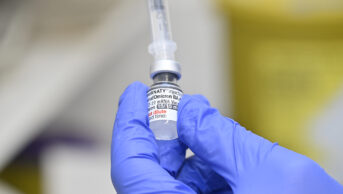
Shutterstock.com
The whole of the NHS is gearing up for what ministers are calling the “biggest flu vaccination programme in history”.
The government announced in July 2020 that more than 30 million people will be eligible for a free flu vaccine this year in England — nearly double the number of people who received vaccines the year before — with the Welsh and Scottish governments following suit in expanding their programmes (see Table).
Everyone aged 50–64 years, everyone in households of those on the shielded patient list, and children in the first year of secondary school will be eligible for the first time for a flu vaccination, as the NHS tries to reduce the pressure on the service for its first winter during the COVID-19 pandemic.
Last year around 15 million people were vaccinated against a target of 25 million, so this is a big challenge for the NHS
On announcing the expanded programme, Matt Hancock, the health secretary, said that this year the vaccine would be given “to more people than ever before”.
Sibby Buckle, a community pharmacist and a member of the Royal Pharmaceutical Society’s English Pharmacy Board, says: “We know the government has committed to 30 million vaccines. Last year around 15 million people were vaccinated against a target of 25 million, so [this is] a big challenge for the NHS – and for all commissioned vaccinating healthcare professionals.”
Primary care networks (PCNs) have already started on plans to deliver flu vaccines as patients drive through supermarket and rugby club car parks.
But with just a month to go before the programme begins, it is very unclear what role — if any — community pharmacy will be able to play, as suggestions that they might administer vaccines in stadiums or town halls remain tentative.
This radically expanded campaign would be a huge challenge in usual times, but in the midst of a pandemic, many are wondering precisely how it could be done.
A new set of challenges
Alastair Buxton, director of NHS services at the Pharmaceutical Services Negotiating Committee (PSNC), says the 2020/2021 flu season is going to “bring a very new set of challenges”.
“Healthcare professionals will face the challenge of needing to find ways to vaccinate people safely in a socially distanced environment.
“If there is a significant increase in demand for vaccination from eligible patients, we expect there will be pressure on vaccine supplies, and we are also concerned about whether there will be adequate supplies of the personal protective equipment [PPE] that health professionals will need when administering vaccines.”
Vaccine orders have already been placed and infection control measures, such as donning and doffing PPE and disinfecting consultation rooms, mean that some estimate that pharmacies could vaccinate only a third of their usual number of patients.
The PSNC advised pharmacies in July 2020 to tentatively plan to offer the service outside of their community pharmacy in sports stadiums, town halls and mosques.
But the government still has not given permission for this to go ahead. In its latest guidance, published on 5 August 2020, the only off-site flexibilities were for pharmacists to vaccinate both care home residents and staff in one visit. Previously, pharmacists could only vaccinate residents of a care home, with staff left to make their own arrangements.
The PSNC told The Pharmaceutical Journal that negotiations over the detail of the pharmacy flu vaccine service were ongoing, and that any “confirmed flexibilities” for community pharmacy will be published separately. It also said that negotiations were under way to allow pharmacies to focus solely on administering flu vaccinations during a proportion of their opening hours, and perform vaccinations out of hours.
Operating flu clinics off-premises would “provide greater space for patients, greater ability to manage patient flow to maintain social distancing, and better waiting facilities”
But time is running out for arrangements to be made, and some local NHS leaders are warning that, unless community pharmacies are given more flexibility, they will struggle to offer any flu vaccination service at all.
The PSNC advice says operating flu clinics off-premises would “provide greater space for patients, greater ability to manage patient flow to maintain social distancing, and better waiting facilities”, while allowing “normal pharmacy services” to continue in the pharmacy.
And allowing these flexibilities could resolve the infection control issue and ease the long-standing tension between general practice and community pharmacy, stemming from years of competition for the funding tied to each vaccination.
Drive-through clinics
Deborah Crockford, chief officer at Community Pharmacy South Central, says being given the flexibility to vaccinate away from pharmacies would be “a big game-changer”.
“It would allow us to work with PCNs and GP practices, who are already planning drive-through and walk-through sessions at venues external to the surgeries, and have offered sessions for community pharmacy to use,” she says.
Guidance from the Care Quality Commission (CQC), which inspects GP practices, says GPs and groups of practices, such as PCNs, do not need to apply to the CQC to change their registration — which details where the practice carries out regulated activity — even if they plan to administer vaccines in a car park.
Instead, it says the lead practice will need to update its “statement of purpose to tell us you are running the vaccination site as a ‘satellite’ of your own practice”.
But pharmacies looking to work with PCNs to deliver vaccines in this way are still “unable to confirm yes or no until relevant announcements are made by NHS England”.
This is presenting a real problem for local planning.
Darlington PCN is planning to provide a drive-through flu vaccination service in a local car park, which it says will allow GP practices to bring their staff, appointments and vaccines and set up within a certain structure and process governed by the PCN. Where Darlington GPs would usually have 44,000 eligible patients, the government’s move to expand the flu vaccine programme has increased that population to 65,000.
Amanda Riley, clinical director of Darlington PCN, says her PCN could be reliant on community pharmacy to help vaccinate the thousands of additionally eligible patients in the area.
What I’ve offered our local pharmacies is that we would consider pharmacy almost like a 12th practice
“What I’ve offered our local pharmacies is that we would consider pharmacy almost like a 12th practice,” she says. This would allow pharmacies to use the drive-through in a similar way to GP practices, on a “rota basis”.
Riley says conversations with County Durham and Darlington Local Pharmaceutical Committee (LPC) have shown “a will to work together”, but the government still needs to give pharmacies permission to take part.
“If they’re not given the ability to vaccinate away from a pharmacy, they’re going to massively struggle to run a flu campaign at all,” she adds.
Vaccine supply
Riley says her GPs have “only got 25,000 vaccinations ordered and we can’t order more”, explaining that the orders were based on uptake in previous years and flu vaccine manufacturers have declined to accept further orders. This leaves a deficit of 40,000 between the number of vaccines available and the 65,000 patients now eligible to receive one.
“If there’s not a big stock centrally, held by the NHS or public health, then we are entirely going to rely on pharmacies being able to make up some of that difference,” she adds.
Greg Burke, chief officer at County Durham and Darlington LPC, says his pharmacies are “hoping for some flexibility” on where the vaccines can be provided, which might allow them to take up the PCN’s offer.
However, he says it would be “highly unlikely, certainly at the moment, that the community pharmacies in Darlington have sufficient vaccine supply to accommodate those additional 40,000”.
What I wouldn’t like to see is lots of worried well people in their 20s and 30s getting flu jabs in September
The Department of Health and Social Care (DHSC) offered some reassurance in its August 2020 update, clarifying that extending the flu programme to those aged 50–64 years would be “subject to vaccine supply” in November and December 2020.
The DHSC told The Pharmaceutical Journal that in addition to the vaccine supply ordered by pharmacists from the manufacturers, the government has been working to secure a significant additional supply of vaccines. It said this will be used to increase uptake in previous at-risk groups as a priority.
Riley doesn’t expect to have a significant number of flu jabs left in December. “I think we will have done it all,” she says.
Two flu vaccine suppliers, Seqirus and Sanofi Pasteur, both told The Pharmaceutical Journal that they have increased manufacture of the vaccines to meet the new demand.
“The vaccination programme will be staggered throughout the season — which we strongly support — starting with those most vulnerable and later vaccinating extended populations to protect as many people as possible,” a spokesperson for Sanofi says.
Still, Graham Stretch, chief pharmacist at Argyle Health Group and clinical director of Brentworth PCN in London, says he is also concerned about stock issues, particularly that supplies will be “chewed up” by those not in at-risk groups.
“What I wouldn’t like to see is lots of worried, well people in their 20s and 30s getting flu jabs in September because they’re motivated, and there being deficient stock for the at-risk groups under 65,” he says.
Addressing capacity issues
In addition to concerns about supply, Stretch says pharmacies also face capacity issues to administer vaccines to the expanded cohort, and suggests pharmacy technicians could play a role.
Pharmacy technicians are not listed by the Medicines and Healthcare products Regulatory Agency as being able to supply or administer medicines to patients under patient group directions (PGDs). Flu vaccinations in community pharmacy are currently administered under the authority of a PGD.
I don’t have any problem from a safety perspective for pharmacy technicians to administer the jabs
“I don’t personally have any problem from a safety perspective for pharmacy technicians to administer the jabs. That’s going to help us with capacity,” says Stretch.
“I’m so used to healthcare assistants [administering vaccinations] in general practice who have a lower level of skill, and don’t have a registration in the way that a pharmacy technician would,” he explains.
The government has said that it plans to consult with “key stakeholders and the public” on expanding “the workforce that is able to administer vaccinations as part of the COVID-19 response”. However, with the consultation unpublished as of 6 August 2020, it is still unclear whether pharmacy technicians will be included.
Rekha Shah, chief executive officer of Kensington Chelsea & Westminster LPC and Pharmacy London lead for vaccinations, says vaccinating in the local community was successful in London before the national influenza programme started in 2015.
“We had pharmacies using churches, community centres [and] mosques to target people while they are present somewhere and likely to be there with their carers or families,” she says.
“Year on year, there was a bigger demand as people got used to that. This is a very viable option.”
Shah says capacity could also be created through “relaxation of some of the bureaucracy wherever possible”, including the “need for signatures on consent forms”.
The PSNC has reassured the profession that it is “expecting the signed consent record to no longer be mandatory”, allowing the pharmacists to rely on verbal consent.
It added that negotiations are also ongoing around reimbursement for the cost of PPE.
According to the latest guidance from Public Health England, pharmacists should change their gloves and aprons after each vaccination, with fluid-resistant (type IIR) surgical face masks and eye protection “subject to single session use”.
“We’ve had all these problems — and we still [do] in a lot of pharmacies — around access to PPE that we need for basic things, let alone if you’re going to be vaccinating 300 or 400 people within 2 months and need to change your aprons and gloves,” says Shah.
I am sure we will be able to deliver on this ambition, so long as the vaccines are available
Even with these lingering questions, pharmacies can still plan for what is set to be an unprecedented flu season on all fronts.
Shah says that, in her experience, “this is the first time that the different healthcare provider groups in any area are coming together to discuss working together as a team to deliver on the necessary numbers.
“I am sure we will be able to deliver on this ambition, so long as the vaccines are available, and the target groups accept the need for vaccination and are willing to have it.”
While community pharmacy is not short of the will to meet demand this flu season, the government still needs to provide the way.
“Pharmacy will do what it has always done,” says Burke, “which is to adapt to the situation and to continue to provide a high level of service”.
Table: Who is eligible for a free flu vaccine in 2020/2021?
| Newly eligible groups | Previously eligible groups | Notes on delivery |
|---|---|---|
| Sources: Department of Health and Social Care/Public Health England, Welsh government, Scottish government | ||
| Household contacts of those on the NHS shielded patient list (England, Wales and Scotland) | “Will be offered the vaccine opportunistically, with the aim to offer to all identified” | |
| People aged 50–64 years (England, Wales and Scotland) | Subject to additional vaccine supply.In Scotland, patients aged 55–64 years will be prioritised over those aged 50–54 years | |
| All children aged 11 years (new for England only) | ||
| Social care workers providing direct personal care (new for Scotland only) | ||
| People aged 65 years and over | At least 75% uptake | |
| In clinical at-risk group | At least 75% uptake | |
|
| |
|
| |
| ||
| Pregnant women | At least 75% uptake | |
| All children aged two to ten on 31 August 2020 | At least 75% uptake |
| Frontline health and social care workers | 100% offered |
| People living in long-stay residential care homes | |
| Those who are in receipt of a carer’s allowance | |


